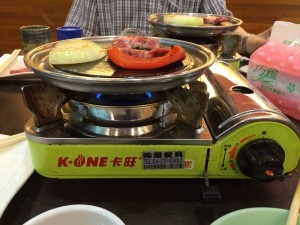(last edited on February 15, 2023 at 12:27 pm)
Monday, November 2, 2015. Sorry for the belated update! I’ve been unable to write much about the Taiwan Trip lately because (1) I’ve getting in the car with Dad at every chance so I can spend more time with him as he drives and (2) My Uncle has embarked on a campaign to show me all the modern conveniences of Taichung City, soft-selling me on the idea of living here for longer stretches of time. Dad’s been driving quite a bit (which he hasn’t done for 20 years) because of a medical issue in the family; I feel better when I’m in the car with him. I’m actually writing this in the lobby of a hospital. For this post, I’ll just talk extemporaneously about a few personal observations I’ve had!
On Exorcising Demons
Over the past five days, I’ve slowly been re-learning how to engage with people here. One of my biggest silly fears is being “found out” as an overseas Chinese who can’t speak either “guo-yu” (the “national language”, Mandarin, as it’s called here in Taiwan; in China the term is “Pu-tong Hua” which translates roughly to ‘common speech’). I’ve been reflecting on just how many of my insecurities in adult life stem from refusing to integrate when I was a transplanted American kid living here. What’s new is that these insecurities may have been the result of being VERY sensitive to feelings, more-so than I think I really realized up to this point.
My dad told me a story a few days ago about how when I was a baby, they wanted me to grow-up appreciating fine music so they played a lot of classical music to me. They noticed that I seemed to cry every time they put on the violin music, and were alarmed that it seemed to upset me so much so they thought, “Ah, baby David doesn’t like music.” But on further observation, they discovered that I seemed to like piano music, smiling and bouncing up and down. I apparently just had a strong emotional reaction to sad violins. I told Dad that actually, I’m much the same way today. Strings and string ensembles really hit me hard emotionally, and if I’m anywhere near live classical music the tears just stream down my face unbidden. It’s very much the case with any really authentic musical experience. I feel it deeply, and these feelings completely bypass the carefully-constructed logical matrix that normally guides my daily action. I’ve had the thought before that if I’d known how to unlock it earlier, I might have become a musician, but my early musical education was conducted in a manner that didn’t suit my learning style. What I hadn’t considered that perhaps this deep emotional well is actually much more representative of my core emotionality, an extreme sensitivity to feeling, that I normally keep walled-off with logic.
As I’ve grown older I’ve learned to let it out more, and have found many signs in my personality since that seem to indicate how emotion is at the core of what I do. While I’ve trained certain aspects of my mind to be quite rational, the motivation for rational action is to support emotional need for myself or others. Today, this gets expressed as empathy, particularly for those who are dealing with issues of identity and acceptance. These are my issues, and it pains me to see other people going through the same struggle.
Differences of Identity
Dad and I were walking through a local market a few days ago when he spied some guavas he wanted me to taste. I’ve been paying extra attention to how purchasing transactions work, so I listened as he talked with the woman running the small fruit stand. Dad is very hard of hearing now, and has trouble especially with higher-pitched voice, but this doesn’t bother him. He just guesses at what he thinks he’s hearing and answers based on that. Or, he just keeps saying what he thinks is appropriate in the moment, particularly when he wants something. During this particular transaction, I noticed that the fruit stand woman started the transaction speaking in Taiwanese, failed to get confirmation that Dad was understanding what she was saying about the price, and then switched to Mandarin. The transaction was made by her just picking the right money out of Dad’s hand, and concluded in Mandarin.
 I found the vendor’s nonchalant reaction very interesting, because Dad is quite Taiwanese, so I mentioned it to him by talking directly into his hearing aid. Since my voice is quite low, he can hear it better and smiled. “That happens sometimes, they think maybe I’m Korean or Chinese. Maybe my Taiwanese sounds a bit funny to them.” What struck me was how much it didn’t bother him. He got his fruit, after all. He just shrugged it off because he’s quite confident in who he is, and doesn’t let things like people not being able to communicate with him easily bother him. I’m the opposite when it comes to speaking Chinese. I feel every mispronounced word as a kind of shameful badge on my Americanized heritage, and I feel stupid and more like an outsider. It doesn’t help that some older Taiwanese can be pretty harsh in their words; even if I can’t quite make out what they are saying, I can totally read what they’re feeling. That’s a third insight that I’ve had recently, which is how easily confused I am when the meaning of words doesn’t match the emotion I am reading behind them. Generally, when I use words I make them try to match the emotional framework behind my intent to communicate. I’m pretty picky about that, and it’s probably one reason why I feel extra-bad when trying to speak Chinese: my desire to communicate by being impeccable with my words. Everytime I speak Chinese, I fail to live up to what I am trying to communicate, and I really used to hate it. But after that experience with the fruit stand woman, I have to ask myself why work myself up over it? Do I really gain anything from being upset and sad that my Chinese sucks?
I found the vendor’s nonchalant reaction very interesting, because Dad is quite Taiwanese, so I mentioned it to him by talking directly into his hearing aid. Since my voice is quite low, he can hear it better and smiled. “That happens sometimes, they think maybe I’m Korean or Chinese. Maybe my Taiwanese sounds a bit funny to them.” What struck me was how much it didn’t bother him. He got his fruit, after all. He just shrugged it off because he’s quite confident in who he is, and doesn’t let things like people not being able to communicate with him easily bother him. I’m the opposite when it comes to speaking Chinese. I feel every mispronounced word as a kind of shameful badge on my Americanized heritage, and I feel stupid and more like an outsider. It doesn’t help that some older Taiwanese can be pretty harsh in their words; even if I can’t quite make out what they are saying, I can totally read what they’re feeling. That’s a third insight that I’ve had recently, which is how easily confused I am when the meaning of words doesn’t match the emotion I am reading behind them. Generally, when I use words I make them try to match the emotional framework behind my intent to communicate. I’m pretty picky about that, and it’s probably one reason why I feel extra-bad when trying to speak Chinese: my desire to communicate by being impeccable with my words. Everytime I speak Chinese, I fail to live up to what I am trying to communicate, and I really used to hate it. But after that experience with the fruit stand woman, I have to ask myself why work myself up over it? Do I really gain anything from being upset and sad that my Chinese sucks?
Nope. Dad doesn’t let it bother him either, and he’s accomplished so many amazing things with his life. I asked him about that a little later: “Dad, you’ve faced a lot of really difficult challenges growing up and professionally as a seminary president. How did you keep yourself from feeling intimidated?” Dad thought about this for a few seconds and said (paraphrasing here), “It was something that just had to be done. I didn’t think about it too much, and just dealt with it. Sometimes other ministers in Taiwan hear how I went to be a minister for a white American church instead of a Taiwanese church community, they express amazement at how brave or courageous I was. But I didn’t think of it that way. I thought, ‘I have the training and I had achieved the necessary level of scholarship, so I was fully qualified to serve in any church. Maybe I was kind of stupid in a way!” Dad just doesn’t think about competence or acceptance, or even himself much of the time I suppose. Of course he likes things a certain way and dislikes other things, but by-and-large he doesn’t put “his identity” on the line. He’s completely comfortable being himself from what I can tell. His identity is for himself. He puts in the work he needs to do to accomplish his ends outside of his sense of identity. I think that is where he and I differ.
Identity, Relationships, and Genetics
Why do I care about my identity so much? And why is so much of my self-identity wrapped up on wanting to communicate impeccably, to be accepted as a competent member of society, and to constantly have harmony between my emotions and actions? Dad might say I am just that way, no value judgement implied. If Mom were still alive she’d probably have a more insightful answer, because I suspect she was much the same way from the stories I’ve been hearing from my relatives. I was too young and unappreciative to take her words deeply when she was still alive, but it seems some part of her is very much part of me. I apparently remind them of her a lot. Ah-jim (a term meaning “aunt who is the wife of the younger brother of my father” if I am getting it right) commented to me that my entire lower half of my face is just like Mom’s, and my Aunt Cathy once commented as I was talking to her that the way I was telling stories reminded her of the time she spent with my Mom as one her her students in the seminary. I guess it’s really nothing that special, as I’m gonna resemble mom and pop like any genetic spawn of their coupled DNA, but it’s interesting to me that as different as I am in my westernized individualistic attitudes, there are perhaps certain personality traits that I can associate. Even being born to Taiwanese parents might have some genetic propensity toward maintaining harmonious relations toward other people; this is baked heavily into the culture, and to some degree I imagine that a family line that really emphasized this might have created a concentration of harmony-seeking character traits. My family is somewhat unusual for being multi-generational Christian in Taiwan, which is less than 2% of the population but large in the amount of social services and extended community OUTSIDE one’s immediate family. Religion here for many people is more ritualized religion than ‘spiritual’ in the Western sense; the attitude of generosity that underlies society in the US due to its Christian history is not the case in most of Asia, though it of course exists in other religions. Anyway, I gather one reason that trust relationships guanxi are so important in Chinese-based societies is because it’s assumed you can only trust your own family and close associates because it’s every family for themselves; the notion of human decency is codified differently with the framework of Confucianism. A related aspect I’ve heard about is mian-tzu, which is like “honor” as it’s perceived socially but way more complex than that. As a non-wealthy westernized Taiwanese-American, guanxi and mian-tzu really isn’t something I ever think about because of the emphasis on individual achievement and social mobility in the USA. It may be just coincidence that I have some of the traits that might work well with being a practitioner of guanxi and mian-tzu…but maybe not. It’s mostly fun to think about, because I am not well-informed in any of what I just talked about :-)
Concluding Thoughts
Grasping for a take-away from these insights: There’s no reason to have these negative feelings, or even to let the reactions of other people really enter into the calculus of bein’ me. Dad doesn’t worry about it, and I think I can learn from his example. What he does instead is engage in the problem in front of him, takes ownership of his training and knowledge, and sees what happens independently of how that relates to his sense of identity. He’s a vessel for action with a strong moral and ethical compass that is the best that he can make them be. What matters to him is that the right action is taken for the right reasons as one can discern at the time. Dad doesn’t worry about mian-tzu for himself, but he is very aware of how others need it for the betterment of his beloved homeland of Taiwan. His notion of guanxi is not the business-relationship / boy’s club patriarchy of old-school Confucianism, but one that is informed by his interpretation of Christianity at its loving and inclusive best.
Maybe the best way of expressing this sentiment is simply I would like to be more like my father. That would be bad-ass!
About this Article Series
This blog post is part of a series about reconnecting with my heritage in Taiwan while testing my mettle as a traveler. All posts are collected on The Taiwan Travel Challenge 2015 Page.






2 Comments
Wow. Very insightful. Thank you for sharing this. I love how you talk about your father. I feel the same way about my dad. Enjoy the rest of your time in Taiwan!
Wow, I needed to read this today. Please keep sharing your thoughts on this trip.